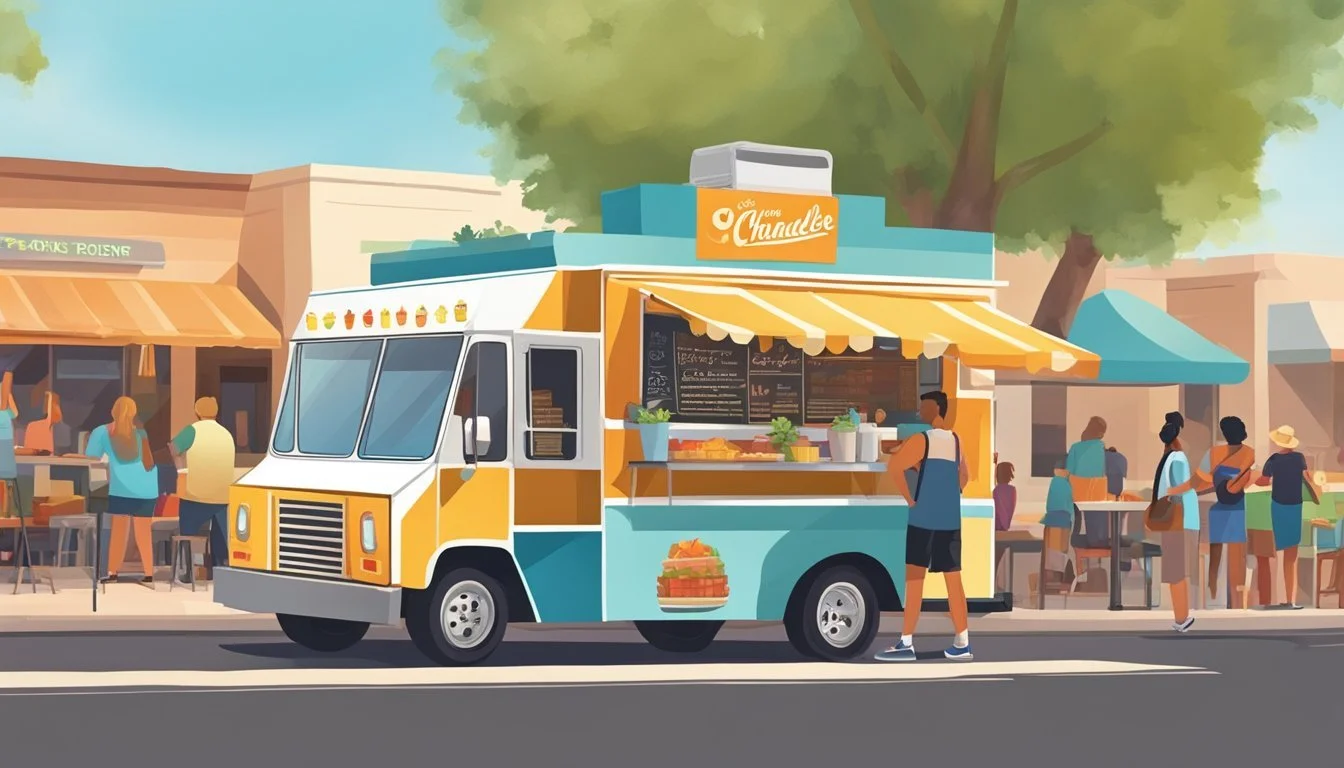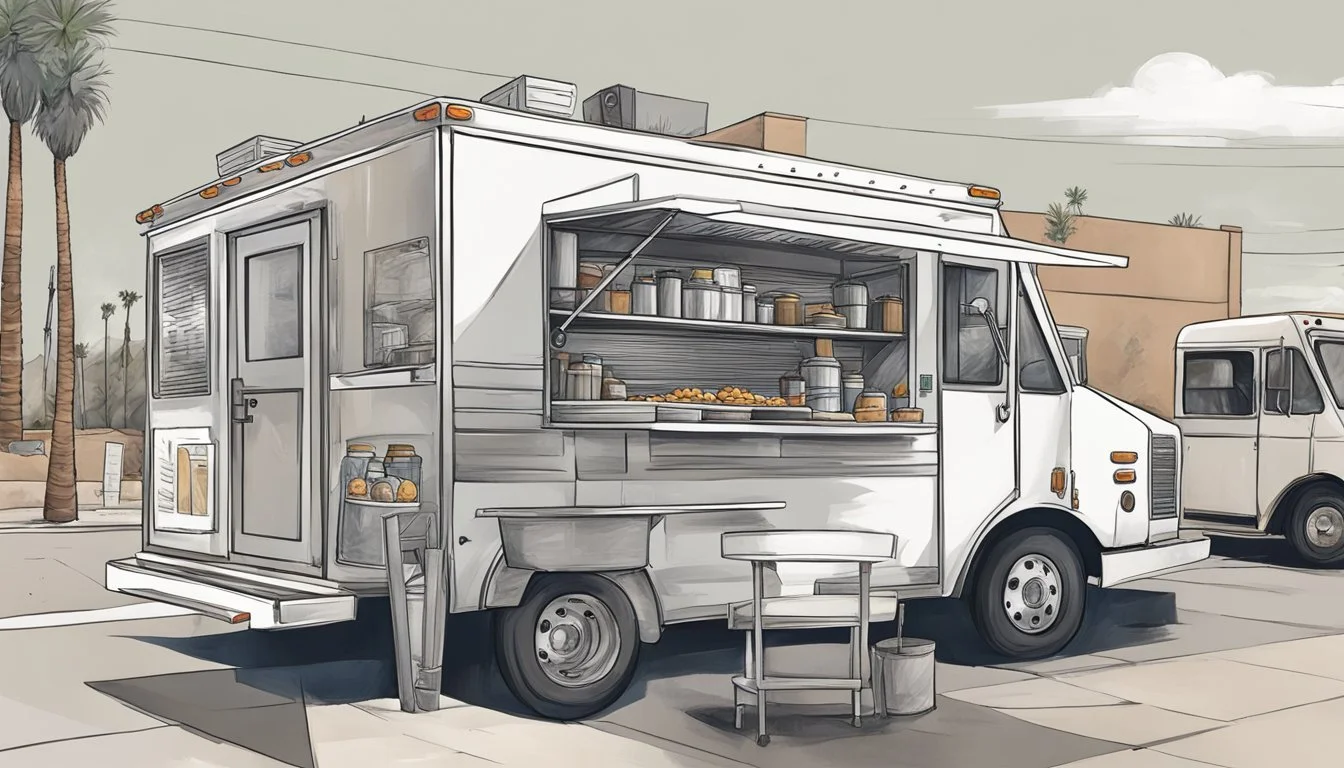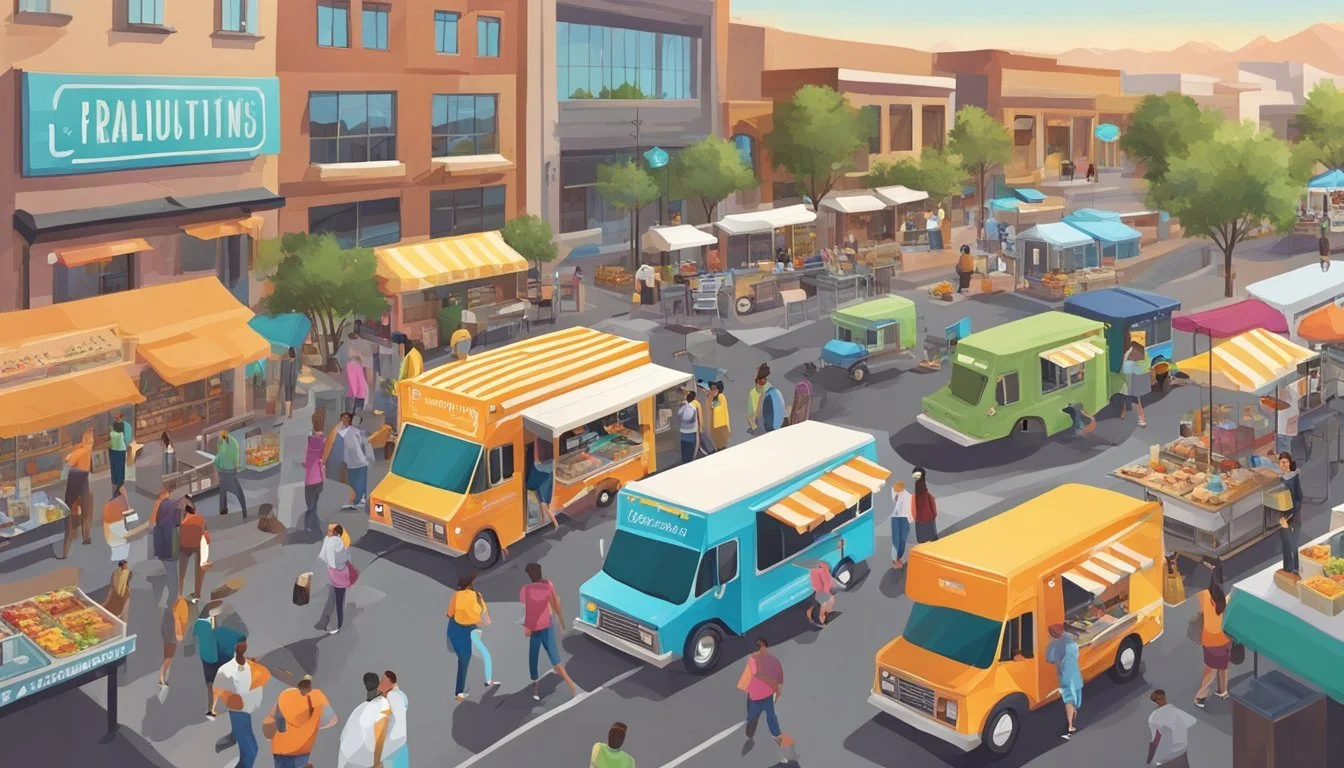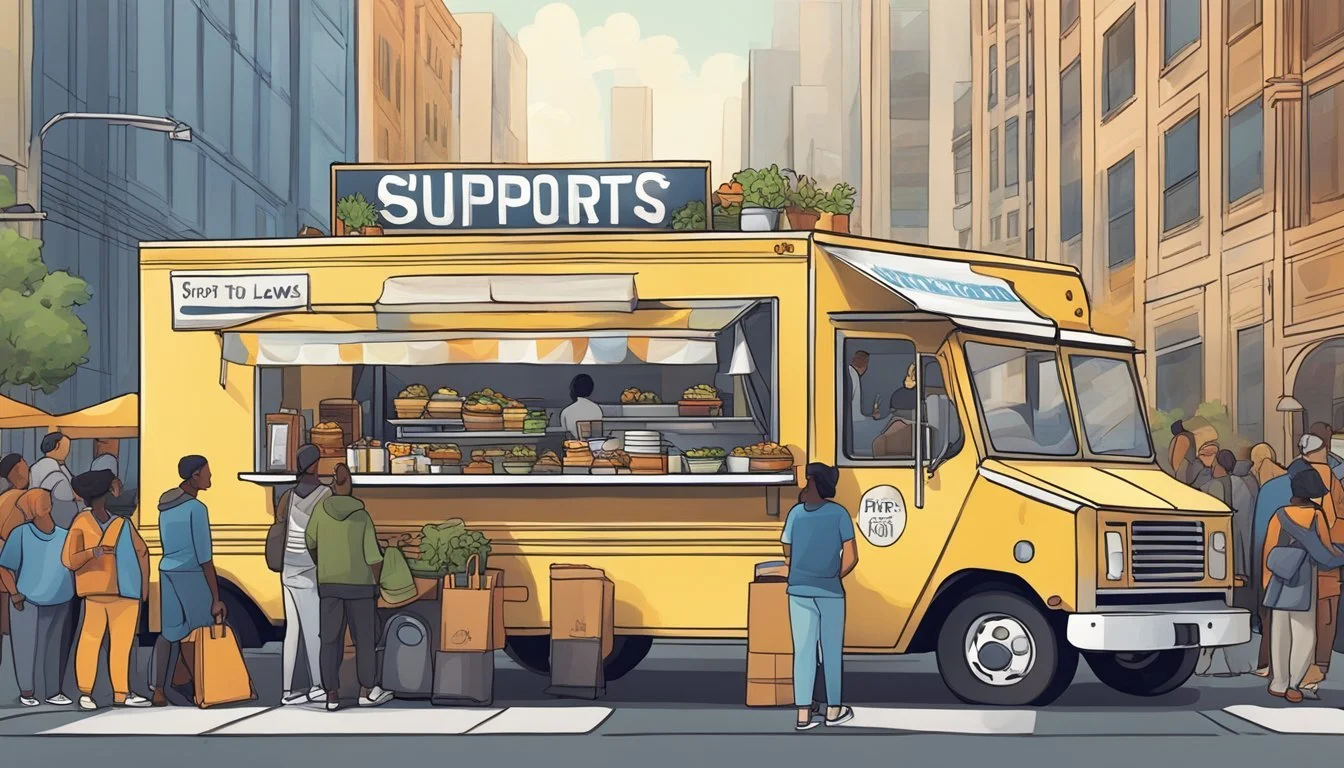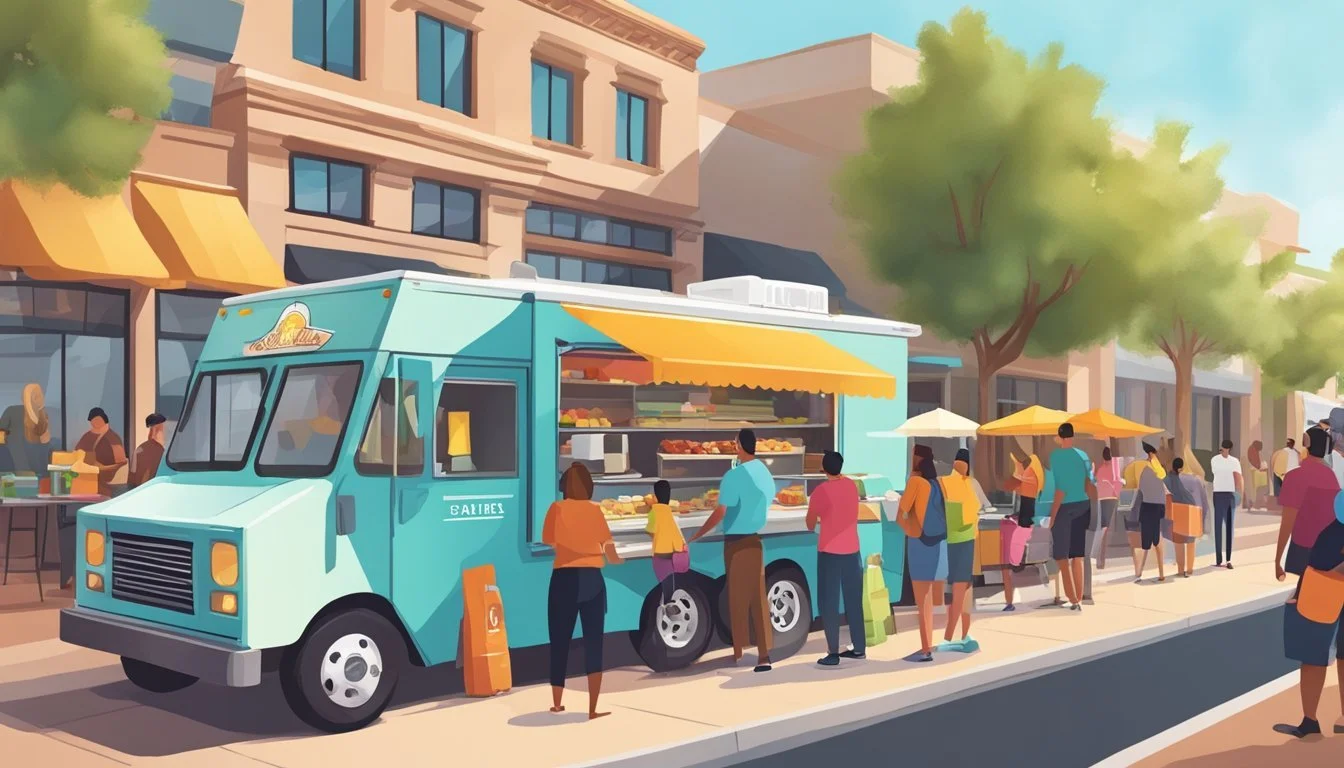Food Truck Laws Chandler, Arizona
Regulations for Mobile Vendors
Operating a food truck in Chandler, Arizona entails navigating a series of regulations set at the municipal level complemented by state-wide legal requirements. In Chandler, food truck operators must adhere to specific health and safety regulations, zoning codes, and licensing demands to ensure that they are conducting business in line with both local and state laws.
The city of Chandler provides guidance on the disposal of wastewater from mobile food establishments, which is an essential consideration for maintaining public health and respecting environmental standards. Moreover, Arizona recently implemented a law that simplifies the process by establishing a single state license for food trucks, which alleviates the need for multiple municipal permits.
Food truck operators in Chandler are also expected to understand and comply with state legislation that upholds uniformity across Arizona, highlighted in documents like the state's official mobile food vendors statute. This balance between local and state requirements is necessary to foster a thriving mobile food industry that is both profitable for the vendors and safe for the community.
Overview of Food Truck Laws in Chandler
In Chandler, Arizona, food truck operations are subject to comprehensive laws that ensure public safety and fair business practices. Regulations encompass zoning requirements, safety inspections, and licensing mandates.
Local Zoning and Location Regulations
Chandler's zoning ordinances specify where mobile food units can operate. These units, which include food trucks, must adhere to location regulations that limit their operations to designated areas and stipulate the maximum time allowed for stops. The most notable among these is the regulation regarding food service trucks that can only halt for sales transactions for no longer than fifteen minutes per location.
Fire Safety and Health Inspections
Food trucks in Chandler are required to pass fire safety inspections to ensure they comply with fire codes. Health inspections are also mandatory to verify adherence to hygiene and food safety standards. These inspections are crucial for the well-being of consumers and the legal operation of food trucks within city limits.
Permit and License Requirements
Operating a food truck in Chandler necessitates obtaining the proper permits and licenses. This process includes the submission of necessary applications and forms that prove the mobile food unit is equipped to serve food safely and in accordance with local food truck laws. The city's legislation aligns with state laws to simplify requirements for operators, allowing a single state license to suffice in lieu of multiple city licenses.
Starting a Food Truck Business
When initiating a food truck venture in Chandler, Arizona, entrepreneurs must navigate a series of legal requisites. These include acquiring appropriate permits, adhering to health and safety regulations, and comprehending the operational guidelines.
Obtaining the Necessary Permits
To operate legally, one must secure a permit from the Maricopa County Environmental Services Department. This involves a detailed application process, which ensures that mobile food vendors meet all county guidelines. A separate state-wide license has also been mandated since 2018, which streamlined this requirement across Arizona, superseding the need for multiple city-specific licenses.
Meeting Health and Safety Standards
Food trucks must adhere to the Arizona Department of Health Services’ regulations to guarantee safe food handling and cleanliness. They must undergo routine inspections, just like any other food establishment, to ensure compliance with health codes. The interior of the vehicle, food preparation practices, and waste disposal methods are key focus areas during these inspections.
Understanding Business Operation Rules
Comprehension of Chandler's specific zoning and business operation rules is essential for food truck owners. It dictates where they can park and sell their products. As per the guidelines, mobile food units must have a licensed commissary or a similar facility where they can perform food preparation and handle other logistical needs.
Compliance with these guidelines is not just about avoiding penalties but also about fostering a safe and reputable business that customers can trust.
Cost Factors in Food Truck Operation
Operating a food truck in Chandler, Arizona, involves several costs that can influence the business's overall profitability. These costs range from regulatory compliance such as licensing and insurance, to the variable costs associated with participating in events.
Licensing and Renewal Fees
Each food truck operator in Chandler is required to obtain various licenses to comply with local and state regulations. A primary expense is the sales tax license, which is vital for legally operating within the city. Additionally, Chandler's specific requirements stipulate costs for the initial licensing and ongoing renewal fees that can impact annual operating expenses.
Insurance Policy Costs
An insurance policy for a food truck is not only a legal requirement but also a significant expense protecting the business against liabilities. Food truck operators in Chandler must secure a policy that covers both the vehicle and its operations. The cost varies depending on the level of coverage and the insurance provider chosen.
Event Participation Expenses
Event participation is a strong revenue stream for food trucks but also incurs costs. Registration fees for events can vary greatly, and food truck operators must budget for this. Moreover, participation may require additional permits per event or spending on resources for meeting event-specific regulations or standards, which adds to the overall expense.
Navigating State and Municipal Regulations
Running a food truck in Chandler, Arizona, requires a thorough understanding of the law at both the state and city levels. With a broad range of rules spanning health and safety to zoning laws, food truck operators must diligently navigate these regulations to ensure their business operations are legitimate and uninterrupted.
Compliance with Statewide Regulations
Arizona operates under a statewide system of laws that govern mobile food establishments. State Rep. Kevin Payne championed HB 2371, a law effective August 2018, which simplified statewide standards for food trucks. These regulations are enforced across all cities, including Phoenix and Chandler, setting uniform health and safety standards.
Key aspects of HB 2371 include:
Harmonization of health and safety requirements for food trucks across different municipalities.
Creation of a single license that allows food trucks to operate statewide.
Limitation on the ability of cities to impose conflicting, additional requirements.
Operators need to comply with these statewide regulations, focusing on food safety, license compliance, and business registration. Details on compliance can be found through the Maricopa County Mobile Food Establishments resource.
Understanding Local Municipal Codes
While HB 2371 reduced duplicative regulation, local municipal codes in Chandler still apply, dealing mainly with operational aspects like zoning, parking, and waste disposal. For instance, Chandler requires food trucks to obtain approval for wastewater disposal and provides specific guidelines for operating within the city's limits.
Chandler municipal requirements include:
Compliance with locations and times where food trucks can operate.
Adherence to guidelines for the disposal of gray water, which includes fats, oils, and grease (FOG), as outlined by the City of Chandler's Food Trucks regulations.
Understanding these local codes is crucial for food truck owners to ensure they are not in violation of city-specific requirements. Each city within Arizona may have nuanced regulations that must be understood in conjunction with statewide mandates.
Challenges and Barriers for Food Truck Operators
Food truck operators in Chandler, Arizona, confront various obstacles from regulatory hurdles to competitive pressures, which shape the landscape of mobile vending in the city.
Competition with Brick-and-Mortar Restaurants
Food trucks often vie for the same customer base as traditional brick-and-mortar restaurants. The latter may perceive mobile vendors as a threat to their customer base, leading to tension and competition. Food truck operators need to maintain a high level of service and unique offerings to attract and retain customers who have many dining options.
Navigating Anti-Competitive Restrictions
In certain instances, anti-competitive restrictions can arise, making it challenging for food trucks to operate. Issues such as restrictions on operating distance from brick-and-mortar restaurants or limited permits available for mobile vendors can create hurdles that favor established restaurants over newcomers and mobile alternatives.
Dealing with Red Tape and Bureaucracy
Food truck operators often face a labyrinth of bureaucratic processes involving multiple licenses and permits. Before laws were simplified in Arizona, for instance, food truck owners were previously required to navigate complex regulatory requirements that not only proved costly but also time-consuming. It's essential for food truck operators to comply with safety and health regulations, which require understanding and navigating the red tape inherent in the business.
Opportunities and Growth in the Food Truck Industry
The food truck industry in Chandler, Arizona is experiencing a notable expansion, fostering job creation and paving the way for entrepreneurs to innovate and grow. This evolution is closely linked to the city’s commitment to safer streets and the promotion of best practices within the mobile food sector.
Local Events and Job Creation
Chandler's lively event scene provides an abundant array of opportunities for food truck owners. Festivals, farmers' markets, and other community gatherings are prime venues for food trucks to cater to a diverse crowd, which in turn supports job creation. Through participation in these local events, food truck operators contribute to the vibrancy of the city's public spaces while also nurturing employment prospects within the hospitality sector. Such engagement with the community aligns with the National Street Vending Initiative, which encourages the growth of street food options while maintaining public safety and street vitality.
Innovative Concepts and Expansion
The willingness of food truck entrepreneurs to experiment with new culinary ideas leads to a dynamic industry ripe for growth. The introduction of innovative concepts extends the variety of food options available to residents and tourists alike. Expansion is not solely geographical but also pertains to the broadening range of cuisines and dining experiences on offer, exemplifying new options and reflecting a pattern of success in the mobile food business. To ensure long-term prosperity, adherence to best practices in food safety and business operations is essential, fostering trust and an ever-growing customer base for these mobile eateries.
Legal Considerations for Operating on Private vs. Public Spaces
When operating a food truck in Chandler, Arizona, vendors must navigate different legal requirements depending on whether they are on private property or utilizing public parking and street spaces.
Operating on Private Property
Property Owner's Permission: Food truck operators must have express consent from the property owner before setting up on any private lot. This agreement should be formalized in writing to ensure compliance with local zoning ordinances.
Sales Tax Responsibilities: While operating on private property, vendors are responsible for collecting and remitting sales tax as mandated by Arizona law. They must keep meticulous records of their sales to accurately report their tax liabilities.
Use of Public Parking and Street Spaces
Public Parking Spaces Utilization:
Vendors can operate from legal public parking spaces, provided they adhere to the same regulations that apply to commercial vehicles, such as paying any parking fees that apply.
There may be restrictions on the times and duration a food truck can occupy a space, designed to ensure fair access and turnover.
Street and Sidewalk Compliance:
When operating within street spaces or sidewalks, food trucks are subject to Chandler's specific parking rules and liabilities.
Food trucks must not obstruct pedestrian or vehicular traffic and must operate in a manner consistent with public safety and convenience.
Comparative Analysis of Food Truck Laws in Different Cities
This section provides a succinct comparison of food truck laws across various U.S. cities, with a specific focus on how these regulations affect local mobile food units.
Case Study: San Antonio vs. Chandler
In San Antonio, food truck operators are required to follow the San Antonio Mobile Food Vending Code, which includes passing a fire inspection if cooking is done on the truck. San Antonio allows food trucks in most parts of the city, except for the historic district unless it's for a special event. Meanwhile, in Chandler, Arizona's recent food truck law simplifies requirements for operators across the state, allowing a single state license and prohibiting cities from requiring separate insurance policies. This contrast highlights the variance in accessibility for food truck owners within different regulatory frameworks.
Case Study: Louisville vs. Phoenix
Comparatively, Louisville takes a more stringent stance, requiring a mobile food vendor permit and adherence to strict zoning restrictions that limit where food trucks can operate, such as a specified distance from restaurants. In contrast, Phoenix is subject to Arizona's state-wide food truck legislation which creates a more unified and streamlined set of expectations for food truck operators, making it easier for new entrepreneurs to enter the market and for existing ones to comply with regulations.
Case Study: Baltimore vs. El Paso vs. Chicago
While Baltimore necessitates food truck owners to procure a license specific to the locale, often mandating trucks to move after short periods to avoid competition with brick-and-mortar businesses, both El Paso and Chicago have their unique challenges. El Paso requires food truck operators to have a commissary agreement as part of their permitting process, which may present barriers to entry. Contrarily, Chicago has eased its regulations, now allowing food trucks to prepare food onboard, but they still face strict parking rules that keep them at least 200 feet away from any retail food establishment. This spectrum from Baltimore to Chicago reflects the diverse urban attitudes and policies shaping the mobile food landscape.
Support Networks and Resources for Food Truck Entrepreneurs
In Chandler, Arizona, food truck entrepreneurs have access to valuable support networks and resources that can help them navigate the complexities of the industry and foster business growth.
Networking with Fellow Food Truck Operators
Food truck operators in Chandler can build relationships and engage in partnership opportunities through regular networking. They often meet at city-sponsored special events where they can share insights on operation strategies, collaborate on marketing efforts, and discuss ways to coexist harmoniously with brick-and-mortar competitors. These connections are vital for understanding the landscape of mobile food vending in Chandler and can lead to collective bargaining power with suppliers and event organizers.
Leveraging Local Small Business Organizations
Local small business organizations provide a wealth of resources to food truck entrepreneurs. They offer educational workshops, mentorship programs, and assistance with navigating regulations and obtaining necessary permits. Food truck owners are encouraged to join organizations like the Maricopa County Small Business Association which supports mobile food units in legal, financial, and health-related matters. Additionally, food truck entrepreneurs can seek guidance from established businesses in the area that act as informal mentors, providing industry knowledge that is specific to the local market.
Conclusion and Best Practices for Food Truck Entrepreneurs
Operating a food truck in Chandler, Arizona, requires careful attention to local regulations and best practices in the mobile vending industry. Food truck entrepreneurs should first ensure compliance with the eased food-truck rules specific to Chandler. Successful operators minimize licensing fees and maintain standards for public health and safety.
Legal Compliance: Adhere strictly to the latest food truck laws and requirements. Securing necessary permits and understanding health regulations are critical steps.
Market Research: Conduct thorough research into the local market to identify customer preferences and competition. Tailor the food truck's concept and menu accordingly.
Financial Management is key. Entrepreneurs should budget for expenses such as ingredients, maintenance, and staffing. Implementing efficient payment systems and accurate billing will streamline operations.
Food Safety is a top priority. They must comply with Arizona's food safety ordinances, like maintaining correct temperature control for food. Regularly training staff on food handling practices is recommended for ensuring quality service.
To succeed, entrepreneurs must balance adherence to regulations with innovative food offerings and superb customer service. Utilizing social media for marketing, offering convenient payment options, and ensuring a strong brand identity can set a food truck apart in the vibrant Chandler mobile vending scene.



